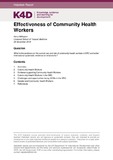| dc.contributor.author | Millington, Kerry | |
| dc.coverage.spatial | DRC | en |
| dc.coverage.spatial | The Democratic Republic of Congo (DRC) | en |
| dc.date.accessioned | 2018-12-13T13:12:30Z | |
| dc.date.available | 2018-12-13T13:12:30Z | |
| dc.date.issued | 2018-11-26 | |
| dc.identifier.citation | Millington K.A. (2018). Effectiveness of Community Health Workers. K4D Helpdesk Report. Brighton, UK: Institute of Development Studies | en |
| dc.identifier.uri | https://opendocs.ids.ac.uk/opendocs/handle/20.500.12413/14175 | |
| dc.description.abstract | What is the evidence on the current use and role of community health workers in DRC and wider international systematic evidence on what works? Evidence supports Community Health Workers (CHWs) effectiveness in delivering a range of preventive, promotional and curative health services; reducing inequities in access to care; and supporting the empowerment of communities to demand social accountability from their governments and others to provide coverage of quality primary healthcare services. CHWs have the potential to contribute to the realisation of health-related goals, including universal health coverage. CHWs role should be clearly defined and they should be integrated into the health system and communities. CHWs are effective when supported in their education, career development, supervised, appropriately remunerated, and working under safe and decent conditions. Effective CHW initiatives and programmes should start with a situation analysis of population needs, health systems requirements and resource implications. WHO guideline recommendations to optimise CHW programmes should be adapted and contextualised to the reality of a specific health system. CHWs are defined by the International Labour Organization as health workers who “provide health education, referral and follow-up, case management, basic preventive health care and home visiting services to specific communities”. CHWs are often relied on in fragile and conflict-affected settings where they are embedded within the community and trusted, and where there is often a shortage of professional health workers. CHWs are well placed to understand gender norms and act to counter them especially where there are opportunities to break down gender barriers and stereotypes during reorganisation of health system governance and delivery after conflict. | en |
| dc.language.iso | en | en |
| dc.publisher | IDS | en |
| dc.relation.ispartofseries | K4D Helpdesk Report;491 | |
| dc.rights.uri | https://www.nationalarchives.gov.uk/doc/open-government-licence/version/3/ | en |
| dc.subject | Health | en |
| dc.subject | Participation | en |
| dc.subject | Social Protection | en |
| dc.title | Effectiveness of Community Health Workers | en |
| dc.type | Other | en |
| dc.rights.holder | © DFID - Crown copyright 2018. | en |
| dcterms.dateAccepted | 2018-11-26 | |
| rioxxterms.funder | Department for International Development, UK Government | en |
| rioxxterms.identifier.project | K4D | en |
| rioxxterms.version | VoR | en |
| rioxxterms.funder.project | 238a9fa4-fe4a-4380-996b-995f33607ba0 | en |

